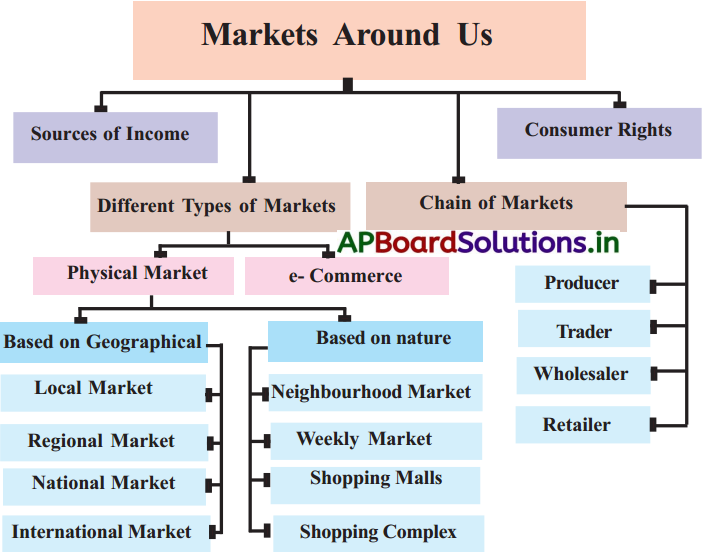Students can go through AP Board 7th Class Social Notes 12th Lesson Markets Around Us to understand and remember the concept easily.
AP Board 7th Class Social Notes 12th Lesson Markets Around Us
→ Markets have played a key role in India since ancient times.
→ A market is a place where buyers (People who buy something) and sellers (People who sell something) interact with each other.
→ Depending upon how they work, broadly markets can be classified into two types. They are 1) Physical Markets, 2) E-Markets.
→ Physical Markets : Physical market is a place where buyers can physically meet the sellers and purchase the desired items from them.
→ Shopping malls, departmental stores, retail stores are some examples for physical markets.
→ Local Makets: A market where the buyers and sellers are limited to the local area where hey are produced. They usually sell goods of daily use. Eg: Vegetables, fruits etc.
![]()
→ Regional Markets : These markets cover a wider area than local markets depending upon the availability of the goods in a particular region or even a group of states.
→ National Markets : This is a market in which the trade for goods and services take place in all parts of the country. For example, selling of fish all over the country transported from coastal region.
→ International Markets: Trading of goods and services among different countries is known as international market.
→ For example, export of crude oil from Gulf counries to all other nation of the world.
→ Neighbourhood Markets: Most shops are located next to our house or at the end of the street. These are called neighbourhood shops.
→ Mode of Payments: Money can be paid in two ways, 1. Physical payments, 2. Digital or Electronic payments.
→ Physical Payments : These kind of payments are carried in the form of Cash, Check or Drafts.
→ Digital or Electronic Payments : These kind of payments are carried through a debit card, a credit card, U.P.I, with Q.R codes, mobile wallets or Internet Banking.
→ Weekly Market (Santha) : Weekly markets are traditional markets. Generally, these markets are found in the rural areas.
→ Shopping Malls : Malls include Restaurants, Banks, Multiplexes and Service stations etc.
→ Shopping Complex : There are shops selling almost all kinds of goods on the same premises in different parts of towns and cities.
→ We can place orders through our mobile phone or a computer device with internet and can buy a variety of things which we like without stepping out from our home. This kind of market is known as e-commerce or online market.
→ Consumers buy goods from shopkeepers.
→ A consumer is a person who buys goods or services for his personal use.
→ Protecting consumer rights is a very important aspect of the market.
![]()
→ On 9th August 2019, Consumer Protection Act was approved.
→ It defines any person who buys any goods, whether through offline or online transactions, electronic means, teleshopping, direct selling or multi level marketing.
→ All consumers should aware of Consumer Rights.
→ Markets play a key role in human development.
→ Different Types of Markets
Physical Markets : Physical market is a set up where buyers can physically meet the sellers and purchase the desired merchandise from them in exchange of money.
E-Markets : Online platform that connect buyers and sellers through internet.
→ Chain of Markets : Is a series of markets that are connected like links in a chain because products pass from one market to another.
→ Consumer Rights : The right to have information about the quality, potency, quantity, purity, price and standard of goods or services, as it may be the case, but the consumer is to be protected against any unfair practices of trade.
→ Producer : A person, a company or a country that grows or makes food, goods or materials.
→ Buyer : A person whose job is to choose goods that will be sold in a large shop.
→ Trader : A person who boys and sells.
→ Wholesaler : A person or company that sells goods in large quantities to other companies or people.
→ Retailer : A person or business that sells goods to the public.
→ Consumer : A person who buys goods or uses services.
→ Credit : An arrangement that you make, with a shop, to pay later for.
![]()
→ Occupation : A job or profession.
→ Firm : A business or company.
→ Fora : Courts or tribunals that listen to the complaints of the public, and suggest actions to be taken.
→ Unscrupulous : Unethical or immoral.
→ Groceries : Food and other goods sold by a grocer or a supermarket.
